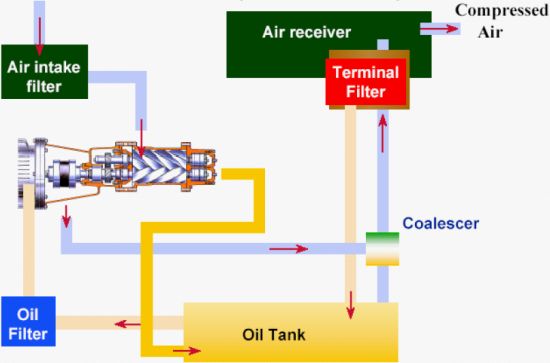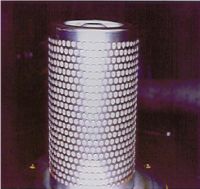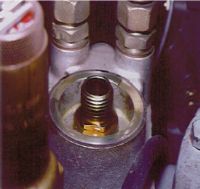 download article
download articleCompressed Air – a hidden contamination risk
Article index
 | Oil Mist Risks | |
 | Reducing Contamination | |
 | Food Grade Benefits |
Essential to the smooth and efficient running of air compressors, lubricating oils help to reduce metal-to-metal contact between the compressor’s rotor or helicoidal screws and the cylinder housing. This helps to minimise expensive component wear and damage, reducing unplanned downtime and enabling operators to realise the low maintenance and reliable performance benefits of compressors. As compressors operate in close proximity to food stuffs, there is a realistic threat of accidental oil contact, which is why Shell lubricants companies have developed a new food grade compressor oil.
Oil Mist Risks
Oil mist can form in compressed air as a result of high operating temperatures and can be difficult to detect. This increases the threat of the oil mist coming into direct contact with food; a problem that can easily go unnoticed until detected by the consumer. By this time though, it can be too late, as consumer health and welfare has been jeopardised. This can bring the company under public scrutiny, which can severely impact on long-term market performance and survival.The amount of oil in compressed air depends on a number of factors, including the condition of the machine and how regularly it is maintained, the condition of the coalescer and filters and whether parts that have been fitted have been recommended by the original equipment manufacturer. Other risk factors include the age of the compressor oil, whether the correct oil is being used and whether secondary filters have been fitted. Failure to maintain and regularly replace filters will also increase the risk of contamination.
As Figure 1 shows, even when using multi-stage filtration, there is still a risk of contamination with food as oil particles remain in the compressed air. While a multi-filter system can reduce oil mist concentration to as low as 0.1 parts per million (ppm), it is impossible (under normal conditions) to remove 100 per cent of oil mist for an end result of 0.0ppm – the maximum tolerance of non-food grade lubricant contamination with food and beverages allowed by the US Food and Drug Administration (FDA).

Fig. 1. It’s impossible to remove 100% of oil mist
Reducing Contamination
While it is possible to avoid the presence of an oil mist by using an oil-free compressor, this is an expensive option requiring replacement of existing non-oil free compressors. A much more cost-effective solution for operators is the use of food grade compressor oils. Specifically developed for use in air compressors, high quality, synthetic, H1 approved, food grade compressor oils such as Shell Cassida ® Fluid CR 46 have been formulated using approved additives and base fluids. This composition means that Shell Cassida Fluid CR 46 is tasteless, colourless and odourless and will not contaminate food in quantities less than the US FDA’s maximum permitted level for H1 lubricants of 10 parts per million.Fully registered by the NSF as H1 for incidental food contact, Shell Cassida Fluid CR 46 is a fully synthetic oil that can increase food safety and compressor performance. Cassida Fluid CR 46 has excellent high temperature resistance to oxidisation, which reduces gum and lacquer deposits on the coalescer, reducing filter saturation and the risk of oil mist. As well as improving air quality, the reduction in deposits enables better fluid circulation and lubrication of the compressor, improving efficiency and lowering maintenance costs.
| Cassida CR 46 – Food Grade Performance Atlas Copco oil-flooded GA 37 screw compressor, after 5,756 hours
This compressor was running on a competitor fluid, which showed deposits before the oil change at 4000 hours. It was flushed and filled with Shell Cassida Fluid CR 46. After 5,756 hours on Shell Cassida Fluid CR 46, the coalescer and oil filter were inspected with the following results: • Both were found clean and free from deposits • Seals were in excellent condition • Oil Analysis showed oil still in excellent condition (oil should be analysed periodically) Shell Cassida CR 46 has been used in these compressors: Atlas Copco, Berko Compressors, Compair Hydrovane, Gardner Denver, Grassair, Hitachi Compressors, Ingersoll Rand, Rietschle, Vemag Maschinenbau GmbH |
Food Grade Benefits
Although the risk of compressed air contamination is difficult to detect, the consequences are much more visible…. especially on the bottom line. Excessive costs can be incurred as whole batches of contaminated food are destroyed and unadulterated products recalled. Furthermore, production lines may have to be completely stopped as the contamination incident is rectified and compressors cleaned.High quality, synthetic, food grade lubricants such as Shell Cassida CR 46 can help operators to maintain cleaner air and improve food safety levels, reducing the adverse impact of oil mist contamination. These safety benefits are supported further with excellent compressor oil performance, which can lead to extended oil drain intervals, meaning that operators do not have to make a choice between performance and safety.
For more information: FUCHS LUBRICANTS GmbH
Click for additional information about Air compression
 back to top
back to top




 companies
companies

